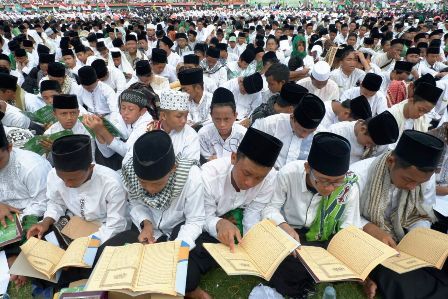A cadre is not merely a student, nor simply a successor in an organizational structure. A cadre is the seed of civilization, a young sprout from the tree planted by the prophets and scholars. To prepare cadres is essentially to prepare the future of the ummah. Without cadres, the struggle will fade into the vortex of history.
Allah the Almighty says:
“Let there arise from among you a group of people who invite to goodness, enjoin what is right, and forbid what is wrong. And they are the successful ones.”
(Surah Ali Imran: 104)
This verse affirms the urgency of cadres as the bearers of the mission of enjoining good and forbidding evil. Such a group cannot exist without a process of cadre development.
The Messenger of Allah ﷺ did not merely preach, he also shaped cadres. Abu Bakr, Umar, Uthman, and Ali did not emerge spontaneously they were molded directly by the Prophet. He planted faith, shaped character, taught strategies, and instilled the spirit of jihad in the hearts of his companions. That is why Islamic civilization stood firmly upon their shoulders.
Also Read: Verses of the Universe in Gaza: The Unyielding Light of Faith
Ibn Khaldun, in his Muqaddimah, stated:
“Every great civilization is born from a generation that is strong, educated, and moral.”
Without cadres who are earnestly developed, the ummah will only become spectators of the progress of other nations. Cadres are not merely heirs, but also purifiers and successors of the grand Islamic vision. They are the ones who determine the rise and fall of history.
Building a mosque is noble, but building human beings is far more sublime. A mosque may collapse, but a cadre will continue to rebuild civilization with their hands and minds. A mosque is a structure; a cadre is a movement. Therefore, a community that neglects cadre development is, in truth, digging its own grave.
The Prophet ﷺ spent 13 years in Makkah not to build physical institutions, but to build people. From Darul Arqam came forth cadres who shook the world. Bilal, Ammar, and Mus’ab ibn Umair they were not aristocrats, but they were molded to become warriors. This is the secret of Islam’s triumph: cadre-building.
Also Read: Prophet Sulaiman Alaihi Salam, the Greatest Muslim King of All Time
Ali ibn Abi Talib once said:
“Raise your children according to their era, for they live in a time different from yours.”
This is not merely an educational tip, but a strategy for cadre development. To prepare cadres means to design the architects of civilization capable of facing the challenges of their time. Without them, the ummah will be left behind and lose direction.
Umar ibn Khattab was not only a just leader but also a master in cadre formation. He appointed governors such as Mu’awiyah and Amr ibn al-As, who were skilled in leading strategic regions. Every great leader always thinks about succession. Without cadres, the baton will fall, and the struggle will cease.
Preparing cadres is not an instant process. It requires vision, patience, and sacrifice, just as the Prophet ﷺ took years to educate his companions. So, do not expect a civilization to rise if we are too lazy to plant the seeds of cadres today.
Also Read: Imaam Yakhsyallah Mansur: Surah At-Tin Indicates the Command to Liberate Al-Aqsa
Islamic civilization is not the work of one person, but the collective effort of cadres from scholars, warriors, and leaders to writers and educators all born from a deep and sustained process of cadre development. They did not emerge from a void; they were the result of consistent education and nurturing.
Imam Shafi’i, Imam Malik, Imam Ahmad ibn Hanbal they were all shaped by teachers who understood the importance of cadre development. No great scholar exists without a sincere teacher who planted knowledge with devotion. Even Imam Bukhari would not have emerged without Imam Ishaq ibn Rahawayh, who inspired him to compile Sahih Bukhari. Thus, every cadre is a reflection of the dedication of their mentor.
A civilization without cadres is nothing more than luxury without a soul tall buildings, advanced technology, yet weak in spirit and lost in direction. On the other hand, with quality cadres, a civilization can be rebuilt from ruins. Just look at how the companions revived Islam after the Prophet ﷺ passed away.
Today, the Muslim ummah is trapped in historical romanticism while neglecting the preparation of future generations. We are proud of Umar ibn Abdul Aziz, but unwilling to raise leaders like him. We admire Salahuddin Al-Ayyubi, but reluctant to educate our children with the spirit of jihad and knowledge. Yet without cadres, our praise for the past will only prolong our suffering in the future.
Also Read: Imaam Yakhsyallah: Nurture Love for the Prophet, One Will Be with Whom One Loves
Ibn Qayyim once said:
“Whoever desires great results must not be reluctant to plant the smallest seeds.”
Cadres are those small seeds that must be nurtured with knowledge, manners, and love. Their hearts must be touched, their minds sharpened, and their paths guided. Only then can they conquer their time.
Now is the time for the ummah to rise and seriously prepare cadres at home, in schools, in study circles, and in communities. For cadres are the soul of the struggle and the light of the future. Without them, Islam will only remain history, not a civilization.
So do not merely leave behind wealth without cadres for a true cadre is the noblest inheritance for the ummah and for the world. [Nia]
Mi’raj News Agency (MINA)
Also Read: Friday Sermon: Emulating the Firmness of the Prophet in Struggle






























 Mina Indonesia
Mina Indonesia Mina Arabic
Mina Arabic